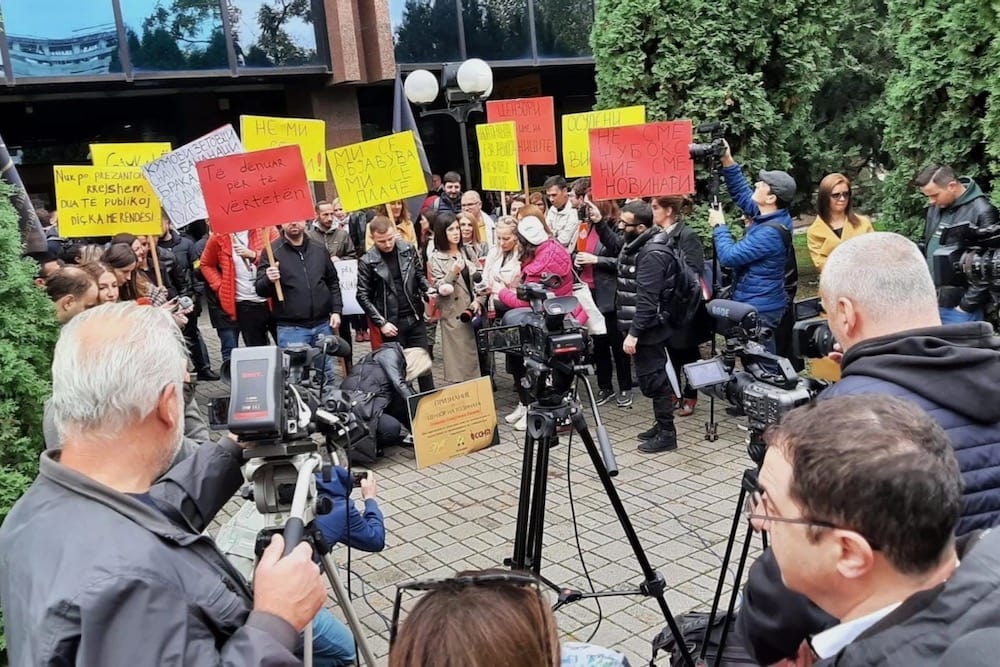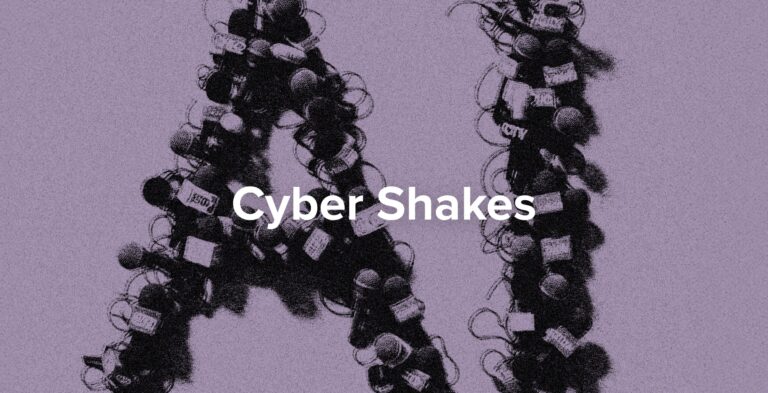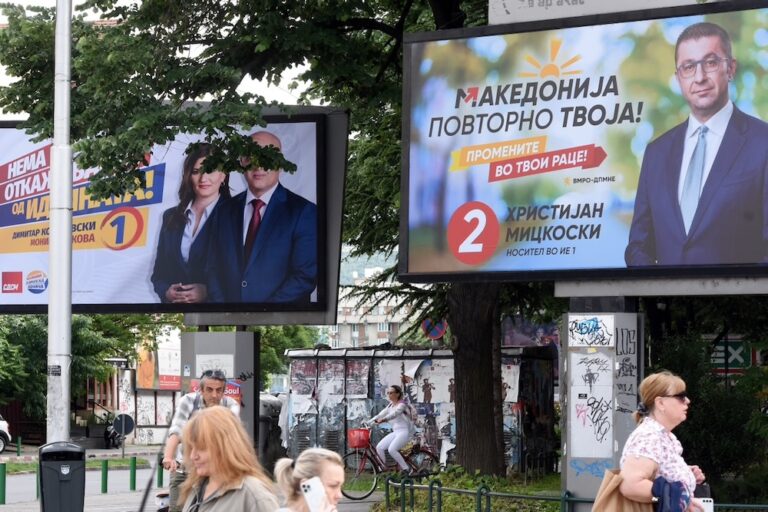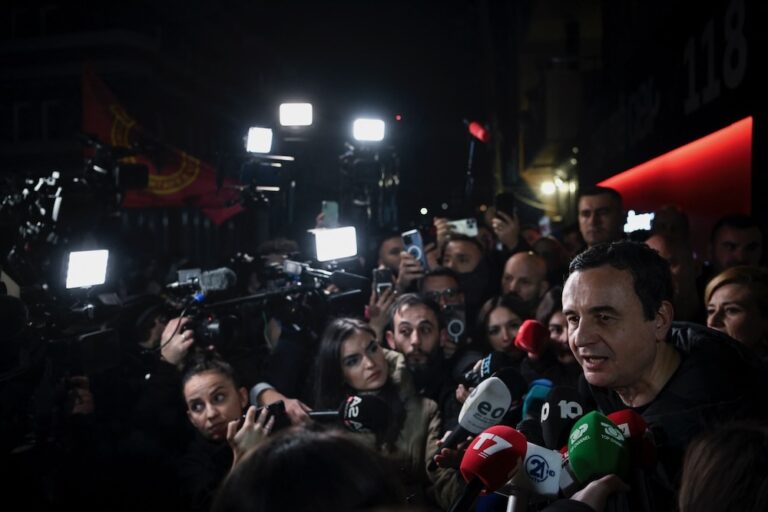In October, the Civil Court in Skopje ruled that 'Investigative Reporting Laboratory' (IRL) had defamed a businessman it named in a documentary about the impact of dirty oil on air pollution.
This statement was originally published on advox.globalvoices.org on 19 November 2023.
Court verdict could restrict the work of independent media outlets
This article is based on the coverage of Portalb.mk and Meta.mk An edited version is republished here under a content-sharing agreement between Global Voices and Metamorphosis Foundation.
Dozens of Macedonian journalists from several media outlets came out for a peaceful protest on November 17 in front of the Civil Court in Skopje to condemn the court verdict against the Investigative Reporting Lab (IRL), which they deem as an attempt to silence and control journalism.
The verdict, which related to an IRL report entitled, Conspiracy against the air (also available in English under the title ‘Europe’s Waste Dump’: How Dangerously Polluting Oil Ended Up Heating North Macedonia’s Hospitals), was announced on October 24. An official who was mentioned in In the documentary, which highlights the impact of dirty oil on air pollution, has sued IRL for defamation and insult. Judge Jovanka Spirovska Paneva disputed the status of journalists in IRL and claimed that IRL is not a media outlet or an association for “journalistic reporting”:
IRL does not have the status of a media outlet as a means for informing the public according to the Media Law, and its members do not have the status of journalists, nor can they, for the purpose of informing the public, create journalistic broadcasts, represent themselves as journalists, or be engaged in investigative journalism and publish all this through the means of public information.
Macedonian journalists said the court decision sets a precedent that threatens the principles of democracy, since it borders on censorship and could lead to the closure of media outlets.
In response to the verdict, the Association of Journalists of Macedonia (AJM) and the Independent Union of Journalists and Media Workers (SSNM) organized a protest reminding authorities that they should not attempt to infringe the right to independent information, and that institutional censorship should not be carried out in favor of the powerful. Media groups also presented a plaque naming the judge as “censor of the year”.
Some of the messages in Macedonian, Albanian and English on the banners that were displayed during the protest, included the following: “Journalism under attack, we are united”, “Censors in the name of the powerful”, “Our work is for the public, not for our colleagues”, “Convicted for the truth”, and “We are not a jukebox, we are journalists”.
Among those who spoke during the protest were journalists Sead Rizvanović, Irena Mulachka, Mefail Ismaili and Tona Kareva, who represented Blueprint, a group advocating for judicial reforms.
Sead Rizvanović cited the fate of A1 TV, Macedonia’s most popular TV station which was closed by the government in 2011 during the period of state capture under the rule of Nikola Gruevski:
The scenario from the time of A1 is being repeated, and just like then, we knew what it was about. The goal was not to shut down the television, the goal was to silence us, a process that was repeated after[wards] in other media and in other ways. We also remember the persecution of Tomislav Kežarovski and other cases. Now it’s happening in a different form, but the content is the same.
[State capture is a term used to describe how state institutions have been manipulated to serve the interests of a particular group or private entity, instead of the common good. It was noted in the 2016 EU Progress Report.]
Journalist Irena Mulachka said that the judiciary does not promote the interest of the public.
For a longer period in the past, judges worked in favor of businessmen and politicians, and we journalists are here to tell the truth. No one can silence us or prevent us from raising our voice or publishing the truth, which is important for the citizens. The most important of all is the journalist’s pen and the public interest is above everything else, because people must be aware of what is happening in the country.
Tona Kareva warned that the court decision seriously threatens the work of civil society organizations.
When trust in the judiciary is at a such low level, this type of verdict does not contribute to increasing trust, and judges must be brave enough to work in accordance with laws and international standards and principles. Such a verdict sends a message to citizens that they should remain silent and passive in the face of corruption and injustice, which is contrary to all principles and standards. The law must serve justice, and citizens’ associations must remain dedicated to working for a democratic society where the fight against corruption and [for] the rule of law and democracy will be the main principles.
The Metamorphosis Foundation stated that the court verdict sets a dangerous precedent affecting both freedom of expression and freedom of association, especially in the section where the court embarks on an assessment of whether IRL and the journalists from this newsroom are journalists or not, and whether their investigative story “Conspiracy against the air” could be presented to the public or only to the members of the citizens’ association, which is also the publisher of IRL.
With this decision, the court establishes a practice that may have serious consequences, as it leads to the restriction of the work of associations and foundations, regulated by Article 14 of the Law on Associations and Foundations. This article states that “organizations are free to express and promote their views and opinions on matters of their interest, to lead initiatives, and to participate in shaping public opinion and policy creation.”



